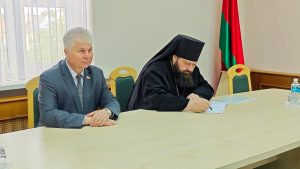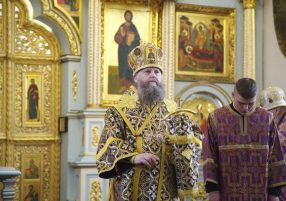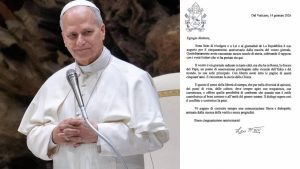Churches and anti-war movement in Belarus


PaulaBorowska
Researcher of religion in Belarus, PhD “Religion and Social Capital: the Case of Protestants in Belarus” from University College London.
Last week pastors, Viačaslau Hančarenka and Antoni Bokun, from two different Minsk-based Protestant congregations were detained and, subsequently, fined. The charges, most likely, relate to performing a Sunday service on the premises of the ‘New Life’, church, forcibly evicted from its building in Minsk last February.
Since the rigged 2020 presidential election and the massive protests which followed, the Belarusian civil society goes through difficult times. The crackdown on non-government organizations continues and, inevitably, embraces religious actors too. At the same time, the outbreak of the Russian war against Ukraine has given the rise of the anti-war movement in Belarus. Many clergymen as well as ordinary members of various Christian churches demonstrate their critical stand against the war. This triggers a hostile reaction from the authorities who allowed Russian troops use the territory of Belarus to launch its attack on Ukraine.
The 2020 movement in Belarus demonstrated the significance of religious organizations in the country, particularly, in times of political crisis. Then they not only did help maintaining social solidarity but also provided a moral support to people. Today, unlike many other civil society organizations, churches, although under high pressure, can still be present and operate in Belarus. They continue to reach out people and condemn the military aggression, often offering an alternative message to the state propaganda. However, along with the brutal suppression of the local civil society organizations, these are the acts of individual religious activists that matter the most.
Two waves of social movement in Belarus
In August 2020, following the fraudulent presidential election, an unprecedented series of protests took place across the whole country. This made the Belarusian regime, led by an authoritarian Aliaksandr Lukašenka, become strongly reliant mainly on the brutal repression. In practice, writing critical comments on the situation in Belarus on the internet, even anonymously, may bring serious legal consequences. As the independent Viasna Human Right Centre[1] reports, today there are over 1,300 political prisoners in Belarus, human rights coalition of project Dissident counts more than 1600 political prisoners[2]. Also, following the peaceful protests of 2020, many civil society organizations were forcibly ceased to exist.
After the break-out of the Russian war in Ukraine on 24 February 2022, a wave of anti-war movement has emerged in Belarus. Historically, overall, the relations between Belarusians and Ukrainians were good and a number of people developed personal, family or business-related connections. The official rationale behind the Russian war seemed preposterous to many Belarusians too, while others had concerns that at some point Belarus could send its troops to Ukraine. At the same time, Belarusian state-run media outlets strongly promoted the Russian perspective on the war.
As two different social surveys for the Novak Lab and the Chatham House demonstrate[3], as of May and June 2022, 43-51% of Belarusian respondents criticize the Russian military action in Ukraine, while 33-39% of them support it. Respondents largely disapproved sending Belarusian troops to Ukraine (only 5-8% of people).
In fact, according to some sources, only in the first week of the outbreak of the Russian war, around 200[4] Belarusians were detained for opposing it. Among them were five people who allegedly damaged railways in Belarus to sabotage the transportation of Russian arms and troops to Ukraine[5]. On the basis of terrorism charges, the court has sentenced them to prison terms.
The voice of the largest churches in Belarus
While the Russian Orthodox Church stands firmly with the authorities and justifies the war in Ukraine, the leaders of the Belarusian church seemed rather cautious to address this issue explicitly. On the whole, their position emphasizes that the conflict is between Russians and Ukrainians only and Belarus is anyhow involved in it. On 26 February, the head of the Belarusian Orthodox Church, Metropolitan Veniamin stated[6]: “The conflict […] did not begin yesterday, but until the last moment there was a hope that it could be resolved in a peaceful way. Those who stand in front of each other […] – they are people blood, faith and spirit-related’. The Metropolitan Veniamin did not explicitly name or condemn the Russian aggressor, though.
The head of the Catholic Church, Pope Francis, sent a stronger anti-war message only more recently, openly calling Russia the aggressor. In one of his previous interviews, Pope Francis, although condemned the war as well as cruelty of Russian troops, noted that the conflict was ‘perhaps provoked’. However, on the day of the break-out of the war, the head of the Belarusian Episcopal Conference, Bp Aleh Butkievič, wrote explicitly: “The brother raised his hand to his brother”. Further, in his official statement, he noted: “This situation cannot but causes pain in our hearts” and called for prayers.
Religious activists against the Russian war
These days the authorities target all those who publicly condemn the Russian war and Christian organizations are no exception to this. If the leaders do not want to risk bringing problems to the churches, many individual priests, on their own initiative, speak out or act against the Russian aggression in Ukraine.
On 4 March, Fr Ihar Lashuk, a Catholic priest, organized a special prayer in parishes near the Ukrainian border. However, most likely, he was charged for reposting anti-war content on the websites such Belsat and Radio Free Europe, officially deemed as ‘extremist’.
Another case involved Fr Mikhail Marugo, an Orthodox priest, arrested in March 2022 for 13 days for a peaceful protest against the Russian war. For having a sticker “Ukraine, forgive!” on his car, Greek-Catholic Vasil Yahorau from Mahiliou, was arrested and, subsequently, fined[7].
Due to the charges of extremism, Catholic priest and a Polish citizen, Fr Andrzej Bulczak from Pastavy, deprived of the right to work as a priest in the country and fined (in absentia), decided to flee Belarus. In his video posted on his youtube channel, Father Bulczak read an anti-war letter. One of the photos in the video featured the logo of Belsat as well as the white-red-white flag which were widely used in the protests of August 2020.
For anti-war activism, police raided homes of Protestant preachers too. One of them, Baptist pastor, Raman Roždestvienskij from Čerykau was fined.
What’s next?
Depending upon their structure and transnational links, human and financial resources, churches can mobilize people and support them, or completely withdraw from public engagement. As it was the case of some other authoritarian countries in the past, religious organizations are important civil society actors in Belarus too. For example, the recent history proves that Belarusian churches played an important social role following the protests of 2020.
However, along with the continuous brutal suppression of civil society organizations in the country, these are individual religious activists (and often clergymen) who engage with the anti-war movement today. This shows how meaningful resources Belarusian churches have – their human capital – which exists in spite of the brutality of the regime. Through their activism, they can reach out people and send a clear anti-war message, even to those who are unconvinced yet.
[1] Read more at https://prisoners.spring96.org/en [Accessed 22 September 2022].
[2] Read more at https://dissidentby.com/en [Accessed 4 October 2022].
[3] Read more at https://www.osw.waw.pl/en/publikacje/analyses/2022-08-01/belarusian-citizens-ambivalent-about-russian-aggression-against [Accessed 18 September 2022]
[4] Read more at https://osce.usmission.gov/on-the-sentencing-of-political-prisoners-in-belarus/#:~:text=As%20of%20today%2C%20there%20are,opposing%20Russia’s%20war%20against%20Ukraine. [Accessed 22 September 2022].
[5] Read more at https://www.rferl.org/a/belarus-railway-guerrillas-prison-terms-ukraine-war/31982008.html [Accessed 20 September 2022].
[6] Read more at https://krynica.info/ru/2022/02/26/mitropolit-veniamin-te-kto-stoit-segodnya-drug-protiv-druga-na-boevykh-poziciyakh-rodnye-po-krovi/ [Accessed 20 September].
[7] Read more at https://www.rferl.org/a/belarus-priest-fined-ukraine-sticker/31776172.html [Accessed 22 September 2022].







